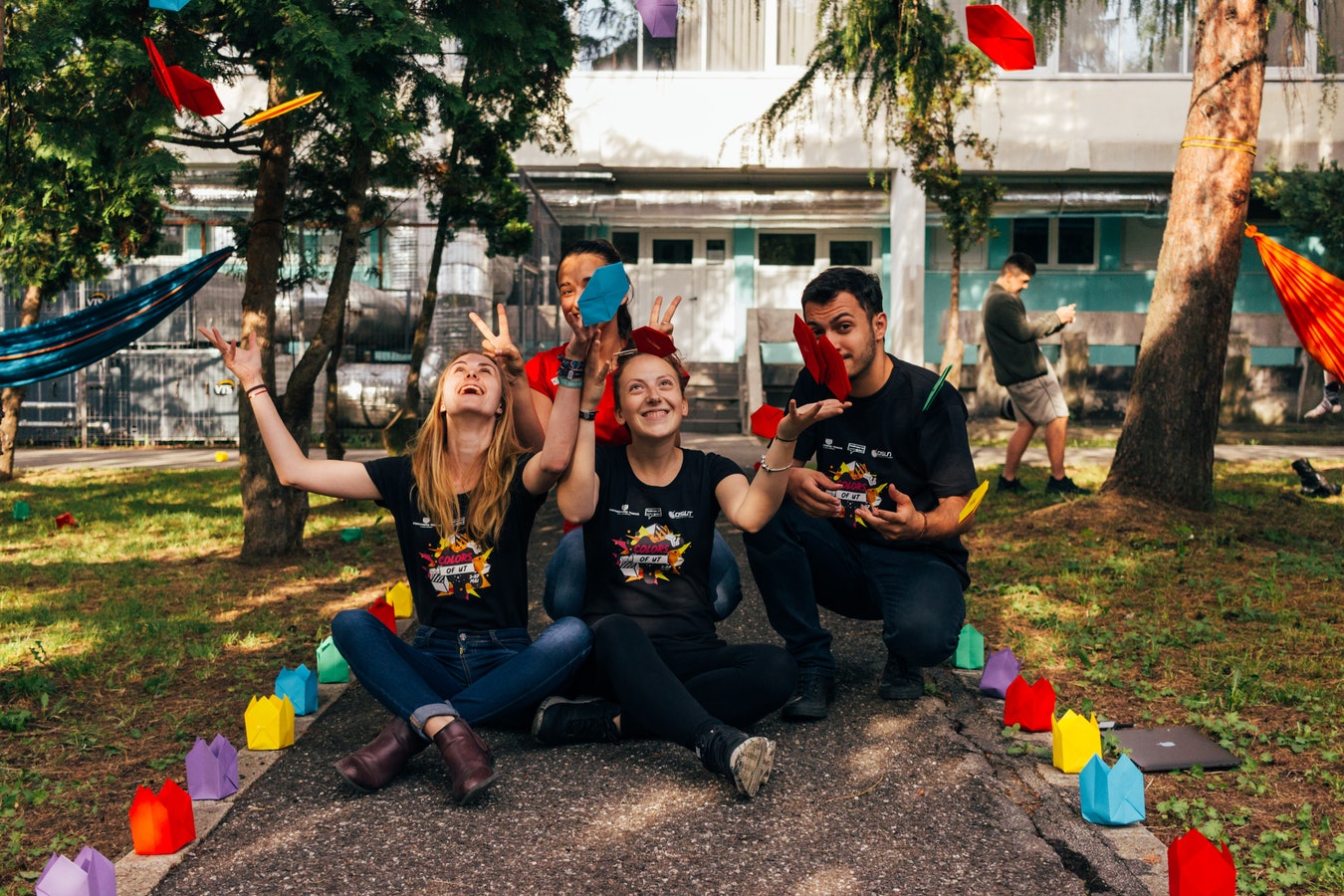How to keep employees motivated at work (and how playing fun games helps)

Bosses have tough jobs.
You’re responsible for employee productivity. But breathe down their necks constantly, and they’ll loathe you. Leave them be, and your next quarterly earnings report may not look very impressive.
The thing is, if you want your employees to do a good job, you have to make sure they’re self-motivated.
Want to get the most out of your time?
Try DeskTime for free!
Try free for 14 days · No credit card required.
By signing up, you agree to our terms and privacy policy.

Imagine how easy that would make your job as a manager. Employees will not only meet their quotas – they’ll exceed them. They will:
- Come to work early
- Work harder
- Take less sick days
- Offer more ideas
…and all that without you having to babysit them. How to make that happen?
You have to let them play. (Yes, you read it right!)
How does play boost productivity?

Remember when you were a child and you’d climb the monkey bars? Or you’d play tag with your friends? Or you’d see a shiny guitar laying around and you’d instinctively want to pick it up and strum the strings?
Nobody had to tell you to do these things, right? You did them because they were fun and had no consequences.
We’re no different as adults. We like fun, and we hate boredom. Doing tasks someone told you to do is what makes work boring.
When I was in college as a theater major, nobody forced me to participate in the Improv class. My professor would announce the next exercise, and I’d spring out of my seat to be the first up. Then when it was time for reflection and discussion, I’d cooperate just as enthusiastically.
Compare this to my Theater History class where the professor talked at us for two hours and then pulled teeth for us to raise our hands. I’m sure you know why.
Improv spoke to my natural human sense of play. It was fun to make up stories, play pretend, and follow impulses. When my professor followed this up with a more serious task, my brain was already primed for engagement.
As adults, we still have that desire to have fun. So, the solution is simple: incorporate play at work, and you’ll keep your employees motivated.

There are social experiments that prove it.
A study by the University of Warwick found that people are more productive when they’re happy.
Researchers gave the experimental group snacks or had them watch a comedy clip for 10 minutes. After that, they asked participants to solve work-related tasks for 10 minutes.
The experiment proved that after having fun, people are more motivated to do even the most tedious tasks. In comparison to the control group, their productivity was 12-20% higher.
And it gets better:
Not only did the experimental group solve more tasks, they also solved them more accurately. All that thanks to some snacks and little laughter!
Why fun works (and when it doesn’t)
If you think about it, fun and work have historically coexisted. During the agricultural age, work songs were the elements of fun that helped make repetitive tasks more bearable, and the long working hours go by faster.
Positive emotions inspire and motivate people, which not only drive employee well-being but also boost business results.
Besides, if the fun involves laughing, that’s particularly good for productivity: laughing releases endorphins and helps relax, which make people more creative and energetic once they get back to work. That also explains why employees who work in a relaxed environment, complain less about boredom, anxiety, and stress.
All the fastest-growing businesses recognize the benefits of fun at work. A 2014 study by the Institute of Labor Economics found that after 6 years, companies that invest in employee well-being and are rated as the best places to work on Glassdoor, consistently get a 144% greater return on investment when compared to other.

However, bear in mind that not all fun is productive. There can be situations when it becomes a dysfunctional jamboree, which gets in the way of actually getting stuff done. And sometimes employees can get so focused on having a good time at work that it becomes a job in its own right. That is, fun becomes a time waster.
How to make work fun for your employees
Companies that effectively incorporate play at work end up to be more successful. Even more – they dominate.
Think Amazon: the Inc. magazine revealed that Amazon CEO Jeff Bezos banned PowerPoint presentations in company meetings and replaced them with fun narrative stories.
Instead of reading bullet points, everyone sits silently for 30 minutes to read a memo that’s written like a children’s book, ”narratively structured with real sentences, topic sentences, verbs, and nouns.” When the time is up, they discuss the topic.
Jeff Bezos argues that such approach works much better than bullet points in a PowerPoint presentation. And he seems to be on the right track: storytelling is in our DNA, which is why we remember and retain information more effectively when it’s presented in the form of a story.
The point is – by incorporating storytelling and other playful activities into the workday, you can not only boost your employees’ productivity but also help them understand things better, remember details, and thus become more efficient.
So, how do you incorporate play into the workday? There are various ways:
Play fun work games
In my Improv classes, we started each day with team building exercises. Such activities build trust among participants, improve team communication, and encourage people to take more creative risks without fear of being wrong (the #1 greatest creativity killer).
With that being said, here are two of my favorite 5-minute exercises you can use:
The Human Knot
How to play it:
Have your employees stand in a circle. Ask each of them to take the right hand of the person standing across them, and the left hand of a different person in the circle. Then, ask the team to untangle itself. The participants can talk, plan and strategize, but they can not release hands.
The result:
The task seems impossible at first, but it’s definitely doable. Once your team succeeds, I bet you’ll hear them cheering. What’s more, they’ll bring the positive mood and team spirit back to their desks. Do this for a week, and you’ll see your employees’ performance improving.

Lone Wolf
How to play it:
Have your employees stand in a small circle and count to 20. Sounds simple, but here’s the catch: only one person can speak at a time. If two people overlap, the group must start all over. And no cheating’s allowed! That is, they can’t elect someone to count all the way up to 20, or have two people bounce the numbers between each other.
The result:
Hear the cheer when the group hits 20! It might take the group several tries, but they’ll learn patience, listening, and how to take their time.
Need more ideas to make your team to have fun at work? Just Google “workplace games” and you’ll find plenty.
Have a good laugh

Among other fun stuff, Google has an internal meme generator for all the inside jokes that Google employees have with each other.
Remember what I said earlier? Laughing makes people more creative and energetic, and thus, more effective at their jobs.
So, learn from the best – it’s okay for employees to take some time off to laugh at silly YouTube videos, or simply have fun with co-workers because later it’ll make them more focused and productive.
Provide a location for employees to relax and be silly
Companies like Google, Facebook, Yahoo have chillout zones with slides, pool tables, and video games. One company from the UK – Pearl Fisher Brainstorms – has even designed a break room with 81,000 plastic balls in it. All because such low-pressure environments help employees relax and clear their minds, and thus boost office productivity.
As PeopleHR explains:
By simply providing the facilities for having fun, such as a recreation room with table tennis and similar games, can help you to get the ball rolling, if you’ll pardon the pun. That is, of course, if you don’t make employees feel guilty for actually using them!
Enjoy peace of mind with office games
Traditional thinking says money and accountability are our only motivators. “Bonuses are the best reward for hard work,” they say. Or, “Give them quotas, and enforce consequences for those who fall short!”
But none of that boost motivation that really matters in the long-term: the intrinsic motivation. To keep employees self-motivated, the workplace should feel almost like a second home, where people can be serious when they have to, and at times – just play around and have some serious fun.

This is a guest post by Arthur Brodskiy from TheMarketingDollar.com. He’s a professional copywriter & SEO content strategist from New York. He helps businesses boost traffic to their sites by writing blogs geared for page 1 Google rankings.
Did you find this article useful? Give it a clap!
Psst! You can clap more than once if you really loved it 🙂